
30 minute read
UNIVERSITY
NEWS
“Some men can live up to their loftiest ideals without ever going higher than a basement.” THEODORE ROOSEVELT 26TH U.S. PRESIDENT
Advertisement
Students report Wi-Fi struggles on campus
Yale Law School cancels in-person reunion
BY SARAH COOK AND ZACK HAUPTMAN CONTRIBUTING REPORTERS
In Bass, Sterling Memorial Library, Beinecke Rare Book and Manuscript Library and the residential college libraries, Yale students quietly do their work on tablets, computers and, occasionally, paper. But in recent weeks, some students have reported dif culties with Wi-Fi access and stability on campus.
Director of Foundational Technology Services Louis Tiseo said that he has not seen any Wi-Fi issues this semester as reported in IT tickets and he does not believe there are more Wi-Fi issues than in a typical year. Still, Tiseo mentioned potential lingering ef ects from hurricane-caused outages, an especially large uptick in the number of devices on campus and a $50 million campus-wide network replacement project that could possibly explain students’ struggles with campus Wi-Fi this fall.
“[I’ve been] trying to watch a video for my math class on Canvas in the library, and the Wi-Fi refuses to cooperate,” said Clementine Rice ’25. “And the library is kind of an essential study spot, so one would expect the Wi-Fi would work well there.”
Internet access at Yale is broken into fi ve networks: the Campus Network, Science Network, Public Safety Network, Facilities Network and Med Campus Network. Within the Campus Network, there are three main Wi-Fi networks: YaleWireless, YaleGuest and YaleSecure. These networks serve the 10,442 staf members, 12,021 undergraduate and graduate students and the nearly 5,000 faculty members at the University. The networks, which include 7,200 Wi-Fi units throughout campus, run throughout much of New Haven, Tiseo said.
YaleSecure is an encrypted network that utilizes students’ NetIDs for access. YaleGuest, on the other hand, is only intended for on-campus guests and is “insecure,” which means it is open and unencrypted, according to the Yale School of Management Information Technology Catalog. YaleWireless is an unencrypted network that is only accessible with a NetID.
According to Tiseo, the networks on campus are being constantly monitored in the control center, and the IT department can also be notified of Wi-Fi issues through the problem tickets. If problems get signifi cantly worse, people from IT are dispatched to restore service.
Tiseo said that there have not been any major Wi-Fi problems found in submitted problem tickets since move-in day. He added that he has “not seen the Wi-Fi being worse than any other year.”
Still, he added there could have been risks of long-term effects caused by the storm on Sept. 1.
“With every building outage, there’s always the potential of having hardware failures,” Tiseo said. “It’s just like your computer if you just press the button and it goes of , you corrupt the database or something like that.”
Each year, there is also an uptick in devices on campus, Tiseo said, adding that due to many students opting to live of campus last year, this increase has been even larger this year.
This year, IT data collection has found that there are over 60,000 devices on campus, according to Tiseo. In the past fi ve years, the Network Team has seen a 12 percent increase in devices due to not only more devices, but an increase in types of Internet of Things, or IoT, devices according to Tim Sheets, director of Network Services. IoT refers to the network of all devices that are connected to the internet in some way, from sensors to smart thermostats.
Currently, the University is undergoing a six-year $50 million project that began in 2019 called Next Generation Network to replace the 20-year old network. Once this project is implemented, it should be able to accommodate more devices, and the Wi-fi networks should be more resilient according to Tiseo.
“We continue to maintain our legacy network and provide basic stable service until we have the NextGen replacement in place,” Tiseo said.
Through the project, the five current networks will be consolidated into a Software Defi ne Network, which is a software-motivated way to centralize networks that functions similarly to cloud computing. The project has already been implemented on the medical school campus starting in January 2020, and administrators are already seeing positive results in terms of increased resilience, speed and ef ciency according to Sheets.
“We’re replacing hardware that’s antiquated and beginning at the end of its life cycle,” Sheets said. “So, we expect things to get a lot better as we go along. And we’ve already seen that on [the] med campus.”
Any outages that could occur due to the Next Generation Network project would be scheduled weeks in advance, and they try to plan them for Sundays from 5 a.m. to 8 a.m., Tiseo said.
While this project is still under way, students continue to report Wi-Fi issues.
Supriya Weiss ’24 said she has not been negatively impacted by the Wi-Fi while on campus, but has noticed its poorer quality.
“I have noticed that when I’m walking to class, sometimes I’ll lose the Wi-Fi for, you know, a few blocks or something like that,” Weiss said. “I do think that it is Yale’s responsibility to make sure that we have secure Wi-Fi, because … having poor internet access puts you at a serious disadvantage when it comes to being successful in school.”
Bryson Weise ’24 told the News that “Yale should make sure that Wi-Fi is as easy to access as possible for all students.”
The Next Generation Network project that intends to improve the Wi-Fi will be finished in 2025 and is being presented at the upcoming education consortium.
Contact SARAH COOK at sarah.cook@yale.edu and ZACK HAUPTMAN at zack.hauptman@yale.edu .
BY JULIA BROWN AND AMELIA DAVIDSON STAFF REPORTERS
Given the recent surge in the delta variant of COVID-19, the University is cancelling in-person components of many of its events that attract large crowds from outside New Haven, including the Yale Law School reunion.
On Sept. 9, Yale Law School Dean Heather Gerken announced via email that the in-person Yale Law School Alumni Weekend, during which Law School alumni from around the world typically come back to New Haven, would be canceled. Virtual alternatives have not yet been announced; Gerken said that staf and alumni volunteers would “explore” options.
Executive Director of the Yale Alumni Association Weili Cheng ’77 told the News that this decision is “in line” with other University decisions about in-person gatherings in the near future. Other major in-person events that have recently been moved online include Yale College family weekend and the launch of Yale’s capital campaign.
“I write to you with the heartbreaking news that the Law School must cancel Alumni Weekend 2021 due to the delta variant surge,” Gerken wrote in her Sept. 9 email to Law School alumni. “In order to ensure that the campus can continue with on-campus teaching and learning — which is core to the magic of this place — the University has had to shift plans for several highly-anticipated visitor events, including making its Campaign launch in October virtual … While we are deeply disappointed with the news, we appreciate everything the University has done to keep our community protected and to ensure we can hold in-person classes safely.”
The Law School had planned to hold two separate alumni weekends this year, given that last year’s reunions were not held due to the COVID-19 pandemic. The first weekend, originally scheduled for Oct. 21 through Oct. 24, was for alumni whose class years ended in 5s and 6s. The second, originally scheduled for Nov. 4 through Nov. 7, was for alumni whose class years ended in 0s and 1s.
“I’m so sorry to be the one to deliver this news, and I will miss seeing you all terribly,” Gerken wrote in her Sept. 9 email. “Thank you for your patience during this challenging time. I look forward to the day when we can all return to normalcy.”
According to the Law School website, Law School alumni who booked hotel rooms at the Blake Hotel, the Graduate New Haven, the New Haven Hotel, the Omni New Haven Hotel at Yale, the Study at Yale or the Courtyard by Marriott at Yale are able to receive a full refund if they cancel their reservation by the hotel’s specifi ed cutof date — the earliest of which is Sept. 21.
Yale College and nearly all other Yale professional schools hold their reunions in the spring, and the Yale Alumni Association is tentatively planning for a series of in-person reunion weekends.
As spring reunions were held virtually in 2020 and 2021 due to the COVID-19 pandemic, the YAA hopes to be able to welcome all those who missed their reunions back to campus in May and June 2022.
“As for Yale College Reunions, we are at this time planning to hold in-person reunions in the spring,” Cheng wrote to the News. “We very much miss hosting our alumni back on campus. Of course, we will closely monitor the situation and make adjustments as warranted and as circumstances dictate.”
The two other major in-person events planned for this fall — Yale College family weekend and Yale’s capital campaign launch — have been moved online.
In an email to Yale College students and parents announcing the cancellation of in-person family weekend, Chun said the move was precautionary, as Yale’s COVID-19 rates have been low so far.
“Yale’s positivity rates are very low, and this precaution is intended to increase the chances that they
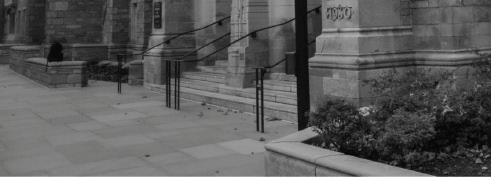
YASMINE HALMANE/STAFF PHOTOGRAPHER
Law School alumni whose class years end in 0s, 1s, 5s and 6s will have to wait to reunite together in New Haven.
will stay low,” Chun wrote in his email. “I hope that you will understand and support this change, and that your family members will participate online.”
Yale’s capital campaign launch, which marks the beginning of University President Peter Salovey’s five-year fundraising campaign, was shifted to a virtual event in early September. Capital campaigns are held once during each university president’s tenure, and the last campaign, held between 2006 and 2011, brought in $3.88 billion.
The typically in-person launch of the major campaign will be held virtually on Oct. 2. The launch sign-up website advertises an “unforgettable online experience” to kick of Yale’s “bold, university-wide campaign.”
The University has over 130,000 living alumni, according to the Yale Alumni Magazine.
Contact JULIA BROWN at julia.k.brown@yale.edu and AMELIA DAVIDSON at amelia.davidson@yale.edu .
Negotiations over future of Union Station nearing conclusion

VAIBHAV SHARMA/PHOTOGRAPHY EDITOR
A new 35-year lease is in sight for New Haven Union Station as local and state representatives are nearing the conclusion of negotiations.
BY CARTER DEWEES CONTRIBUTING REPORTER
In 2017, former mayor of New Haven Toni Harp told WNHH radio that the city would like to own New Haven Union Station. However, negotiations since then between the city of New Haven and Connecticut seem unlikely to end in New Haven owning Union Station. Still, city of cials now expect greater transparency regarding the operations of the station and its future infrastructure developments over the next 35 years.
Representatives from New Haven and the Connecticut Department of Transportation have now tentatively agreed to terms for a 35 year lease of New Haven Union Station — a station that carried as many as four million passengers annually before the pandemic. The new lease is set to begin in July of 2022 and comes after extensive discussions that are closely connected to New Haven’s “Hill to Downtown Community Plan,” an economic development plan originally composed in 2014. Michael Piscitelli, the Economic Development Administrator for New Haven, said he views Union Station as the “linchpin” for the Hill to Downtown Plan.
“The goal of the negotiations is to reimagine [New Haven] Union Station for the next 35 years,” Doug Housladen ’04, head of the New Haven Parking Authority, told the News. “We’re really anticipating federal dollars to support the private dollars that will be here, as well as state dollars if needed.”
The organizational structure of the station will remain relatively unchanged in the new lease. The station is still owned by the state of Connecticut, which they lease to New Haven. New Haven subcontracts the maintenance and staf ing of the station to the New Haven Parking Authority.
According to Amtrak’s 2019 data fact sheet, New Haven Union Station is the busiest Amtrak station in Connecticut. Lines from Amtrak, MTA-North and CT-Rail have stops at the station, and several buses of er service.
“There should be housing put in and some more development [surrounding the station]. It shouldn’t be left open, like it is now,” said Evan Brooks of Newtown, Connecticut.
Brooks said he passes through Union Station often, and criticized the long lines of cars from rideshare services outside the station. He said that building a new parking garage outside the station could be a solution to this problem.
During negotiations, representatives from New Haven and the state of Connecticut agreed to construct a 600 space parking garage with additional amenities and services at the site. This garage would increase parking capacity and build some “vertical development” near the station, Piscitelli said. He noted that the new developments will allow private companies commercial access to about four million people a year, following the station’s expected return to pre-pandemic ridership.
“We wanted to make sure that [the area around Union Station] wouldn’t be overloaded just with parking, but that it had services and amenities for the neighborhood and attracted development as well,” Piscitelli told the News.
Kafi Rouse, spokesperson for the Commissioner’s Of ce of the Connecticut Department of Transportation, expressed support for developing commercial infrastructure in the area around Union Station.
“Union Station’s customers have been the center of our Union Station negotiations with the City of New Haven,” Rouse told the News. “We are working to ensure Connecticut’s railroad stations center the needs of the communities they serve and the plans for Union Station serve as a prime example of accessibility.”
Hausladen said he imagines Union Station becoming the center of multiple growth districts in the city, referring to the Downtown and Long Wharf neighborhoods. An important facet of the new lease, according to Hausladen, is the collaboration between city and state to “entice developers into a public-private partnership.”
Currently, the station has a Subway and a Dunkin’ Donuts, but Hausladen suggested that more options should be available to the station’s many customers.
Piscitelli agreed, and said that Union Station is no longer just a commuter station into New York but it is also a “welcome mat” for New Haven and Connecticut. Piscitelli said also he hopes to see more New-Haven themed features of the station.
Currently, infrastructure bill H.R. 3684 is moving through the United States Congress. If passed, the bill will likely provide funding for local projects around the country. Piscitelli said that one of the city’s requests for funding under that law would be related to Union Station.
New Haven’s Union Station fi rst opened in 1920.
SPORTS
SAILING
OPENING WEEKEND SUCCESS Last weekend, the Elis won both the Pine and Harry Anderson Trophies and placed third at the Toni Deutsch Women’s Regatta. Teddy Nicolosi ’24, Anisha Arcot ’23, Mia Nicolosi ’25 and Ximena Escobar ’25 all earned NEISA honors.
FOOTBALL
FIRST HOME GAME Yale football will host its f rst home game tomorrow at 12 p.m. against Holy Cross. The stands will be open to all spectators: unvaccinated attendees are required to wear masks, while those who are fully vaccinated may attend without a mask.
FOR MORE SPORTS CONTENT, VISIT OUR WEB SITE
goydn.com/YDNsports Twitter: @YDNSports
YALE DAILY NEWS · FRIDAY, SEPTEMBER 17, 2021 · yaledailynews.com
“I am trying to establish great relationships with all of the [women’s tennis] student-athletes and not only get to know their games but get to know them better in general as people.”
RACHEL KAHAN
W TENNIS HEAD COACH
Club sports making a return
BY ALEX YE
both indoor and outdoor practices
YALE DAILY NEWS
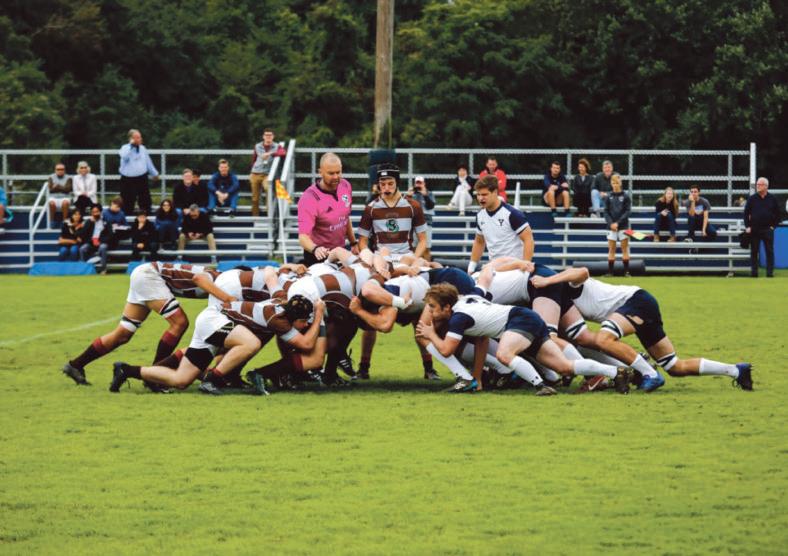
After a year of virtual practices and canceled contests, club sports are fi nally anticipating a return to in-person activities.
BY ALEX YE CONTRIBUTING REPORTER
For the first time since March 2020, club sports will be able to hold in-person practices and contests this fall. In the coming months, students will have the opportunity to try out, practice and compete in a variety of athletic activities ranging from fi gure skating and fi eld hockey to spikeball and squash.
Since its founding 50 years ago, the William Clay Ford Club Sports Program at Yale has of ered students an opportunity to play competitive sports on a non-varsity level. During the 2020-21 season, however, club teams were unable to hold formal practices due to stringent pandemic protocols. With the start of the new school year, however, updated guidelines have allowed a return to in-person activities.
According to the University’s Fall 2021 Club Sports COVID-19 Guidelines, which were updated Sept. 2, were allowed to begin starting Sept. 7. Club sport competitions may start this Wednesday, with an indoor gathering limit of 20 people and an outdoor gathering limit of 50 people. The outdoor limit includes spectators, but fans are currently not allowed to attend indoor club sports events. The guidelines also require facial coverings to be worn during any indoor activities, unless actively hydrating. Additionally, all students participating must be fully vaccinated.
Yale’s Director of Club Sports Tom Migdalski has sent at least four emails obtained by the News with increasingly updated guidelines to club leadership. Migdalski sent an early edition of the guidelines on Aug. 30, which stated that “violation of any of the guidelines below may result in the elimination of a club’s privileges including the loss of competition and practice or suspension of the club. Individual students may also face university discipline.”
Most sports held their last of cial in-person practices over a year ago, making this fall season highly anticipated. For many teams, last year’s guidelines made it impossible to practice at all.
“We tried to get guys together last year, but with the 10 person limit, it was obviously very dif cult considering that the sport is 15 versus 15,” Mahlon Sorensen ’22, club men’s rugby president, said.
The return to in-person activities has many students around campus looking to get back in the action with club sports. Sorensen noted that compared to previous years, this year’s activities fair saw an increased amount of interest. Vice president of club polo Hilary Griggs ’24 made similar remarks in an interview, stating that the club may have to be more selective this year due to more people trying out for the team.
Returning players also expressed optimism regarding the updated guidelines. Club swimming president Eliza Kravitz ’24 told the News that in-person club practices have “always been the highlight of my semesters at Yale.”
Despite the excitement, the current COVID-19 protocol is still concerning for many club sport teams, mostly because of the persisting restrictions.
“I was a little disappointed about the 20 person limit,” Kravitz expressed. “We want as many people to participate as possible, and it might be hard to replicate what we had in previous years.”
Another issue for some club teams is reserving gym time for practice. Zoe Sinclair ’22, co-captain of women’s club basketball, explained that the team is still waiting to set a practice sched-
SEE CLUB SPORTS PAGE 10
Handsome Dan XIX to debut at Yale Bowl
BY KYLIE VOLAVONGSA CONTRIBUTING REPORTER
For the first time since the outbreak of the pandemic, the Yale Bowl is ready to welcome old and new faces — and in some cases, snouts.
HANDSOME DAN
Yale football’s home opener against Holy Cross this Saturday marks a new chapter not just for the team and the Bowl, but also for Kingman, who will be attending his first football game as Handsome Dan XIX. While he has made an appearance at a recent women’s soccer game and a football scrimmage against Brown, an event of this scale is unfamiliar territory for the 8-month-old puppy. Still, Kingman and his handler Kassandra Haro ’18 are up for the challenge.
“He was born to be a mascot,” Haro said. “He loves crowds and people and watching sports — even at the risk of wanting to join in. But obviously, he’ll stay attached to me during the game.”
A proven natural with the fans, Kingman always draws a crowd making his rounds across campus. In fact, it is easy to fi nd
SEE HANDSOME DAN PAGE 10
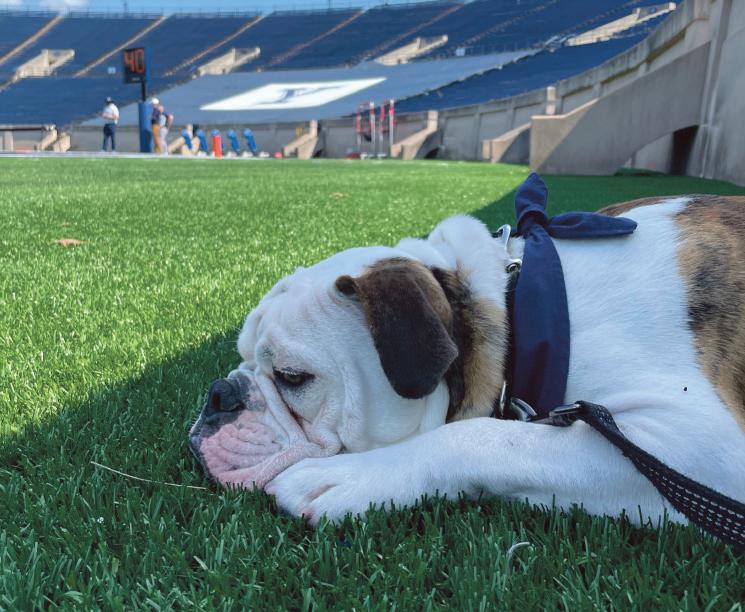
COURTESY OF KASSANDRA HARO
Kingman, the Olde English Bulldogge who serves as Yale’s new mascot, will be attending his fi rst football game as Handsome Dan XIX.
Twin sailors continue success at Yale
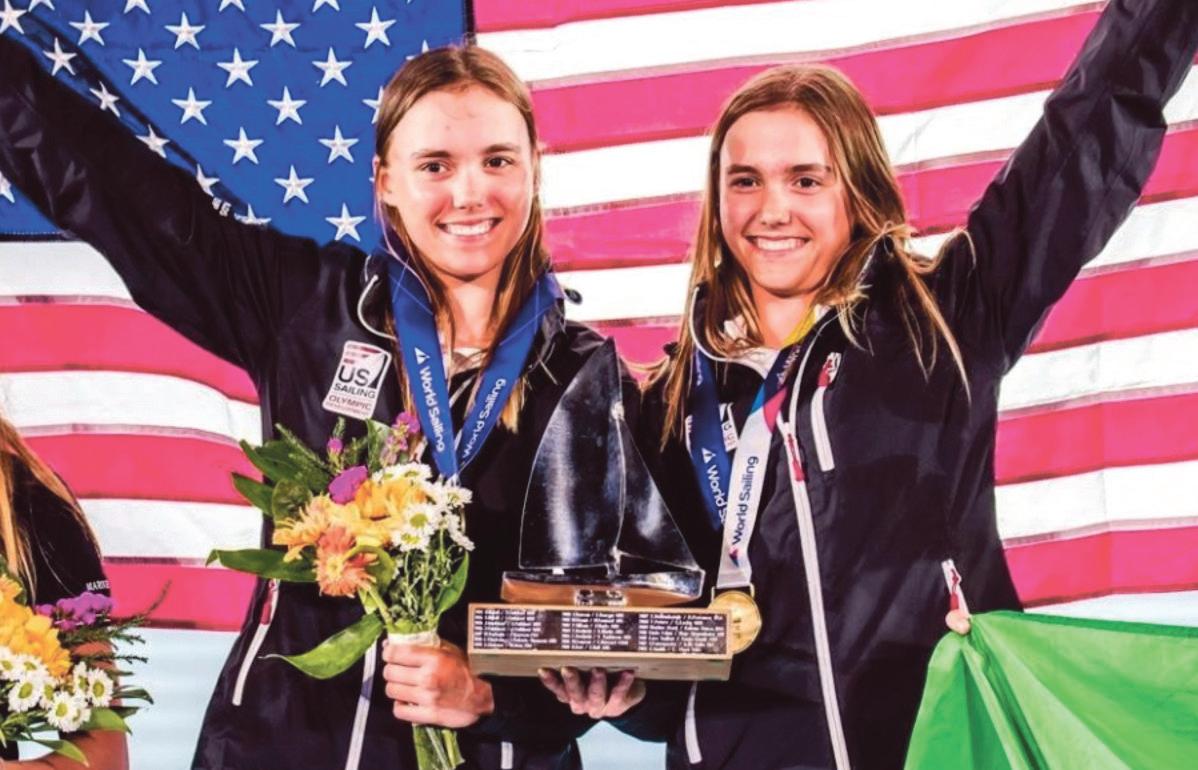
COURTESY CARMEN AND EMMA COWLES
Honored as the 2018 U.S. Sailing Rolex Yachtswomen of the Year, fi rst years Carmen and Emma Cowles ’25 are set to make a splash in the collegiate sailing world.
BY MELANIE HELLER STAFF REPORTER
Instead of participating in more common sports like soccer or basketball, identical twins Carmen and Emma Cowles ’25 looked to the water.
SAILING
The Cowles twins are natives of Larchmont, New York, a small town on the Long Island Sound, and their parents wanted them to embrace the nearby water every way they could. By the age of 9, the sisters started sailing at their local yacht club in the Optimist boat class — a small, single-handed dinghy used by children. As they learned the ropes, they began racing in regional, national and, eventually, international competitions.
This fall, the twins are starting as fi rst years competing for Yale’s sailing program.
“We both learned to really love the competition aspect of the sport,” Carmen and Emma Cowles wrote to the News in a joint statement. “Having a twin to compete with and against helped us improve really quickly.”
While they spent years racing in the same boat, the Cowles sisters are both skippering for the Bulldogs this season, so they will be work-
SEE SAILING PAGE 10
Yalies take fi rst, team takes third at HYP
BY MARGARET HEDEMAN AND WILLIAM MCCORMACK SPORTS EDITORS
In their first cross country meet since the NCAA Northeast Regional Championships in November 2019, two Yale runners — Robert Miranda ’22 on the men’s team and reigning Ivy Heptagonal champion Kayley DeLay ’22 on the women’s team — each won their fi rst race of the season last weekend.
XC
Running at the season-opening HYP meet against Harvard and Princeton at West Windsor Fields in New Jersey, Miranda and DeLay led the way for each Yale side, but the Bulldogs fi nished third in team standings for both the women’s 4.8-kilometer and men’s 8-kilometer. The race was the first of six meets in which the Elis compete before the Oct. 30 Ivy League Cross Country Championships, which will also take place at Princeton’s West Windsor Fields.
Miranda told the News he was happy with how the race unfolded.
“After not competing because of Covid it was important to see how our team is doing compared to our rivals in the Ivy League,” Miranda wrote to the News. “We knew before the meet that Harvard and Princeton would be tough to beat, and even though we didn’t have what it took on Saturday, we’re still hopeful for the rest of the season.”
Harvard and Princeton, the Bulldogs’ toughest competitors in the Ivy League, are nationally ranked in men’s and women’s cross country, respectively. In the most recent national coaches’ poll, the Crimson ranked No. 28 on the men’s side, and the Tigers ranked No. 24 on the women’s side. Regionally, Harvard ranks No. 3 in the Northeast, while Princeton is No. 3 in the mid-Atlantic in men’s cross country. On the women’s side, Harvard is No. 5 in the Northeast, and Princeton is No. 2 in the mid-Atlantic. Yale is ranked 14th in the Northeast for men and ninth for women.
In the men’s event, Harvard’s Graham Rance led for almost the entirety of the race, yet Miranda made up 11.9 seconds in the last .77 miles to close with just over a four second gap between fi rst and second place. Yale men’s cross country head coach Paul Harkins told Yale Athletics that this strategy was exactly Miranda’s original race plan.
“He tried to be as conservative as he could — hang back and then run the second half really tough. He took over with 500 to go,” Harkins told Yale Athletics.
Sean Kay ’24 followed Miranda for the Blue and White, coming in 12th place overall with a time of 24:32.9. After Kay, Yale took places 14 through 20.
Eleven out of the 17 Yale men runners had not yet completed with the Blue and White before Saturday. Miranda highlighted their “encouraging performances.”
“[The underclassmen] showed a lot of potential, and they’ll only get better throughout the season once they adjust to college races,” Miranda said.
Though there were only four Harvard runners who placed in between the top two Bulldogs compared to Princeton’s six, the rest of the fi eld placed the Crimson on the top of the leaderboard by one point.
SEE XC PAGE 10
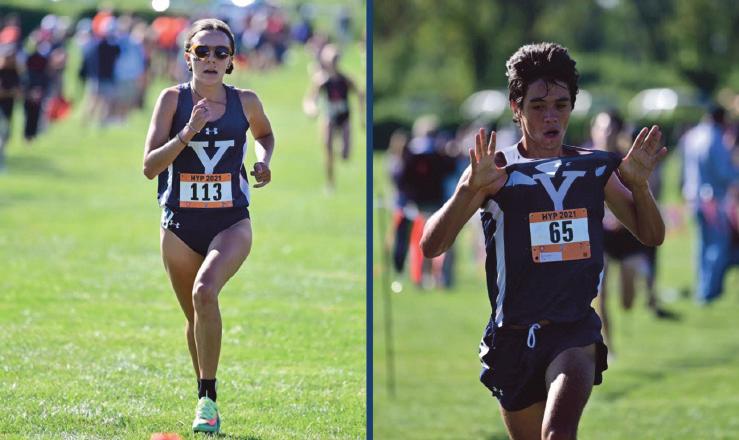
COURTESY OF YALE ATHLETICS
Cross country runners Robert Miranda ’22 and Kayley DeLay ’22 each won their respective races at HYP.


WEEKEND

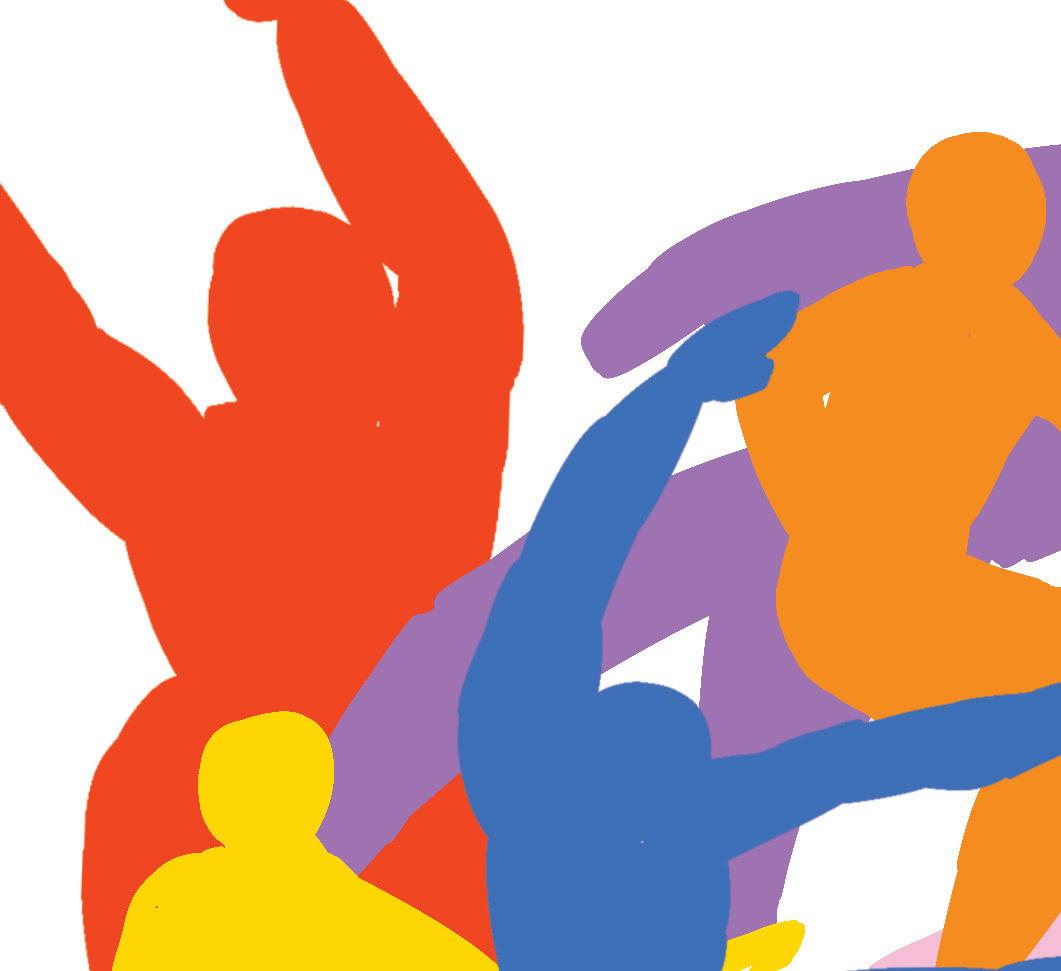
// ANNIE YAN


Body-ody-ody-ody-ody-ody-ody

// BY MAYA WELDON-LAGRIMAS
Real hot girl shit. Or at least that’s what we told ourselves. It was our mantra as we prepared for a year where we could no longer wear pajama bottoms to class, carefully curate Zoom lighting or turn of our cameras. Where we would no longer exist as two-dimensional faces and instead, where our three-dimensional bodies would be thrown together, after 18 months of hiding, without any other choice but to be seen.
“Real hot girl shit.” We chanted quietly, this of course being a gender neutral state of mind. We manifested it desperately in Target’s dressing room mirror, at our hometown gym, or while we frantically browsed Savage x Fenty online before our fl ight to BDL. Maybe we believed that we really were hot shit. Maybe we didn’t. Either way, we were eventually thrown onto the violent catwalk that is a college campus.
As I walk down Prospect Street each morning, all I see is a body here, body there, body-ody everywhere. Legs in tiny shorts or thrifted jeans, shoulders exposed or covered, feet in Birkenstocks or boots. People that I’d known from Zoom class are taller or shorter than I’d imagined. Nails are painted, hoops dangle from ears and there is a watch on a wrist. I am both angered and awed by the sheer number of beautiful young adults around me. Skin glows. Hair blows. It’s truly a spectacle to behold.
Everything gets more real on nights out. Being surrounded by people shifts from a passive viewing experience to one that is interactive and tactile. I am reminded that the bodies have a biological impulse to reckon with one another. At Woads or a frat, I push my way through the body-ody-ody. I bump a bicep, wade through waists and smell sticky skin. For many, a large part of the collegiate experience is engaging in the rituals of horny teenagers with all the confusion those can bring. Inevitably, the kissing, cuddling and fornicating ask a lot from our physical form.
Naturally, people have dif erent responses to being a body. Some people revel in the idea of being seen. Others do everything they can to hide. A lucky subset don’t see themselves as characters on an infi nite stage, constantly subjected to objectifi cation by others. But I imagine that even for these individuals, it’s hard not to be reminded.

“He’s a skinny legend now.
“She glowed up.”
“I ate too much.”
“They eat too little.”
“Quarantine did him well.”
“Chloe Ting didn’t give me a bubble butt.”
“All I wanted was to hook up.”
“I never want to hook up.”
“The forbidden rice is forbidden because it’s cutting season.”
We hear these words slipped into conversation with harmless intent but the truth is that these casual tidbits are both the expression of and trigger for the often complicated, consuming and painful relationship many people have to their bodies. While many of us deal with disordered eating, self-esteem issues, body dysmorphia, sexual trauma and the plethora of other psychological burdens associated with being a physical being, these comments are only a small fraction of the feelings that we choose to express. So when I hear these cues, I am reminded to not only see bodies but to wonder about how people see theirs. Do people sit in lectures stressed, insecure or worried that they aren’t beautiful enough? In the dining hall do people feel judged for having a bad hair day or bitten nails? At a party, are strangers struggling with eating or afraid of physical touch? I also wonder if some people go throughout their day without worrying about any of this, and wonder how that might feel. I imagine it would feel good.
As a group of people known for the quality of our minds, it seems as though our bodies should be an afterthought. It seems as though we should spend all of our time burying our heads in history, or participating in politics, rather than calculating the calories in our lunch swipe. Alas, this is not the case. Perhaps it is because Yalies are not just intellectuals, but also high achieving, world-class conformists, who deeply internalize society’s expectations. Perhaps it is just because we are human.
The point is that our bodies are important to us and are thus worthy of deep and sustained consideration. As future leaders, thinkers and moralists, it is our responsibility to be conscious and critical of our bodies’ relationship to the world, each other, and ourselves. When we recognize that systems or behaviors help us more than hurt us, we have an equal responsibility to change.
For example, maybe over dining hall conversations we should talk a little bit less about our new diet. Maybe while walking down Prospect Street we should gently push ourselves to appreciate beauty rather than envying it, or fi nd it in new places all together. Maybe, if we consistently struggle with our bodies, we should seek help from a friend or a therapist. How we deal with the conundrum of having a physical form is complex, multifaceted and probably different for everyone. The purpose of this essay is not to lay out all the answers but to acknowledge that stepping out of the Zoom box and into the world of bodies is the same as facing any new frontier. It is a novel, intrepid landscape that triggers fear, requires bravery, and begs the question of how we should move forward.
To read more about bodies and being back on campus I encourage these wonderful essays.
https://yaledailynews.com/ blog/2019/11/07/knight-when-healthhurts/ https://yaledailynews.com/ blog/2021/05/06/169137/ https://yaledailynews.com/ blog/2020/11/25/insight-the-dangers-ofthe-lockdown-slimdown/ https://yaledailynews.com/ blog/2020/01/30/olurin-just-too-pretty/ https://yaledailynews.com/ blog/2021/04/08/knight-transparency-referrals-and-mental-health-at-yale/
// BY MICHAELA WANG

“Which resco are you in?” I yelled over the deafening chatter of a first-year orientation event. A current sophomore had introduced me to the term earlier in the summer, so I relayed it with a sense of pride. Finally, a Yale abbreviation I successfully integrated into my daily jargon and a step towards sounding like the rest. But before the equally naive first-year could respond, an upperclassman interjected, shaking their head in disapproval: “It’s college or residential college.” The portmanteau — a word blending the sounds and combining the meanings of two others — isn’t the first of its kind at Yale. Just as resco blends “residential” and “college” to convey our hallmark housing system, FroCo loosely merges “freshmen” and “counselor” to describe the senior peer leaders, and L-Dub combines “Lanman” and the first letter of “Wright” to distinguish the cozy Old Campus hall.
For many, resco is more phonetically efcient than an otherwise mouthful. “It’s a lot easier than saying ‘residential college’ and it’s kinda catchy,” suggests Abby Davis ’24.
Resco is also more logical than the more arbitrary combinations. “Resco was easier to understand than any other abbreviations,” says David Zhou, a visiting student from Beijing. “When I first arrived at campus, I had no idea what a FroCo was. Where does the o come from? Froyo? A frozen counselor?”
Despite its efciency and logic, the portmanteau has not been added to the list of Yale lingo. Worse, resco has sparked upperclassmen attempts to eradicate the term, in favor of the strongholds “residential college” and “college.”
This trivial controversy brings to light the tension between preserving tradition and breaking it, as well as the way in which Yale language constantly changes to capture and better fit the circumstances of our time.
Most fingers point to the current sophomore class. An anonymous senior complained about how those “Zoom kids’’ paraded onto campus last fall, disseminating random terms without the supervision of wiser elders.” Before coming to Yale, Tori Sondeide ’25 remembers hearing the term spoken aloud by a sophomore explaining which resco he was in.
Some sophomores admit it themselves. “We came onto campus during the pandemic year, when there was no one there to tell us what was right and what was wrong,” says an anonymous sophomore.
But the seeds of resco were actually planted far wider. Underclassmen report that they saw resco written in admissions advertisements, spoken aloud during admissions events and even passed down by current upperclassmen. Karla Ramos Gonzalez ’25 first heard resco said by a student ambassador during a Yale information session this past winter. Maya Alvear ’25 remembers reading resco in emails sent to prospective students and hearing it from Yale student YouTubers explaining the housing system. Grace Bu ’24 thinks that resco existed before the class of 2024 set foot on campus.
Regardless of whether the portmanteau was born from current sophomores, the Admissions Ofce marketing, or even current upperclassmen, it has already grown popular among first years — particularly in the written form. By the spring of 2021, resco had rapidly spread across Discord, GroupMe and other social media exchanges between incoming members of the class of 2025. Now, most first years waver between saying “resco” and “residential college”; others say “residential college” but write “resco.” Most are not aware that the term contradicts traditional lingo.
The question arises: Can upperclassmen eradicate the term from Yale lingo, as their time at Yale wanes and new generations follow?
During a FroCo meeting, Charlie Uchno ’22 warned his group to avoid the term. “I, as a FroCo, wanted to set up my FroCo-ees for utmost success. One of the ways to achieve success is to use historically normalized terms. I wanted to do what was best for them.” He isn’t the only advocate.
“If I heard one of my frosh say resco, I would say ‘residential college’ or ‘college’ in response to them and try to reinforce that none of the upperclassmen use resco,” says Kynzie Clark ’22, another FroCo. “There are just so many language disconnects between underclassmen and the graduating class, which is the only class to have a full year on campus. It’s strange to see how the virtual year last year has created such a divide between people that were on campus before last year and people who weren’t.”
Other upperclassmen surrender their control, acknowledging that language is dynamic even at a 300-year-old institution. “I think it’s going to take another couple of years before the trend catches on,” suggests Mette Køchs-Nielsen ’23. But for now, Yale language is changing — whether upperclassmen have control over it or not.
Contact MICHAELA WANG at michaela.wang@yale.edu.
WKND RECOMMENDS
Loving to learn.



